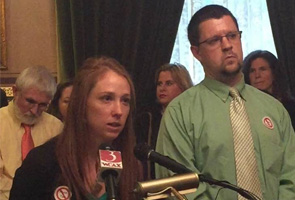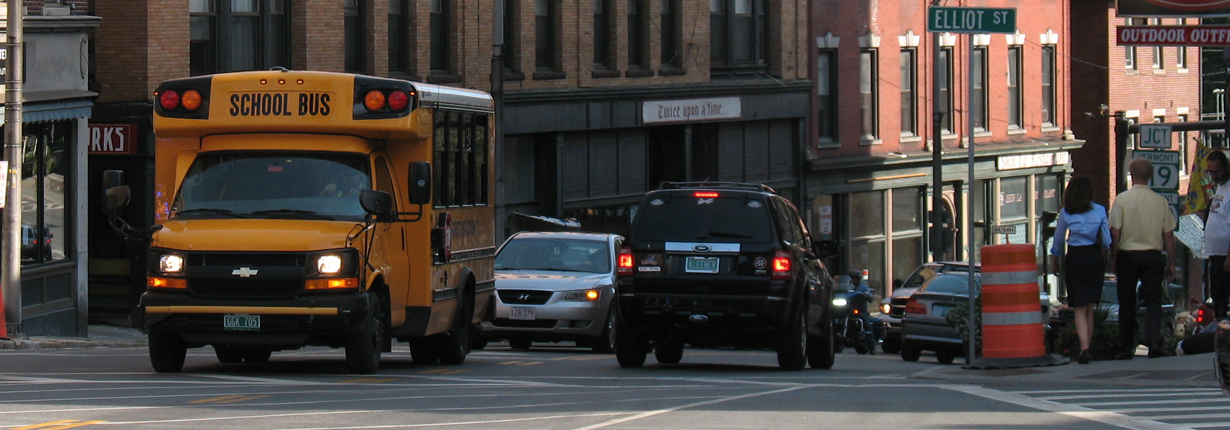
Rosie Nevins-Alderfer, Director of Youth Services’ Restorative Justice programs, spoke passionately earlier this week at a Montpelier news conference releasing the new Governor’s Poverty Council report, which offers specific recommendations on reducing poverty. One recommendation to the legislators was giving more support to programs which ensure that “low resource” Vermonters are able to travel to employment by addressing the challenged faced by the state-wide Driver’s License Suspension program that Youth Services administers in Windham County.
Making a compelling argument for the audience of legislators, socials service agencies and journalists, Nevins-Alderfer outlined how having one’s license suspended can create a downward spiral where it is difficult to get to work to earn the money to pay the fines which quickly accumulate.
“Do I stay at home because my license was suspended for nonpayment or do I drive my sick child to the doctor in Boston?” Nevins-Alderfer asked, quoting her clients. “Do I drive to work because I am the sole income earner of my family? Do I drive to stay connected with my recovery community? Or risk relapsing into addiction?” she said, outlining some of the impossible choices her clients are making around their suspended licenses.
According to the Youth Services manager, Vermont has some of the highest number of non-traffic related offenses that can result in license suspension for non-pay: littering, illegal trash burning, underage possession of tobacco… “When a person with resources receives a ticket—for any violation, they pay it before suspension can occur, Nevins-Alderfer argued. “When a person with low or no resources receives a ticket they are faced with another impossible choice: rent or my license? Medical care or my license?” she said.
The license is suspended— Nevins-Alderfer explained, —but they often keep driving to access employment or essential services which may result in receiving more tickets for operating under suspension. “We’ve worked with individuals that have over 15 ticket violations—one of which was an actual substantive violation, maybe speeding, the rest are operating with suspended license,” Nevins-Alderfer elaborated.
Vermont’s establishment of the Driving with License Suspended program within Court Diversion has literally changed lives, according to Nevins-Alderfer. “Sometimes our case manager is the first point of contact someone has upon reentering the community from incarceration. Sometimes she is merely a port in the storm of other chaotic events,” she said.
The Youth Services Justice director went on to say that their clients, as a result of the program, are getting new jobs, better jobs, going to school, staying sober by staying connected to their recovery communities, bringing sick family to the doctor, attending their kids school or sports event for the first time.
The program reinstates a person’s license upon completion of a contract with the Vermont Judicial Bureau to pay all fines at an income sensitive rate. The person keeps their license so long as timely payments are made each month.
In order to make the program sustainable—the Judicial Bureau needs more resources and support, emphasized Nevins-Alderfer. “Although a person may have their license reinstated immediately once their contract is signed by a judge, the wait time has increased over the past months from about a week to more than three months,” she said. “For a person with limited means, three months is an eternity. It might mean losing their job, falling deeper into homelessness because they can’t get a job or reach essential services,” she stressed. Nevins-Alderfer advocates that more resources are vital to the success of this important program.
Nevins-Alderfer applauded The Pathways from Poverty Report as providing innovative and essential solutions to the significant challenges many Vermonters face. But she pointed out that the rental housing initiatives, employment initiatives such as work for pay or ban the box support for individuals leaving institutions: all of these programs have the essential prerequisite that people are able to get to work, get to service agencies, get to school—and not have to choose between paying citations or keeping food on the table and roof over their heads. “Access to driver’s licenses in the rural state of Vermont is an economic justice issue and a social justice issue,” Nevins-Alderfer concluded.
Nevins-Alderfer explains,” It’s important in our approach as a community to hold individuals accountable, but equally important to hold each other accountable for the structural harms that cause crime in the first place: poverty, lack of resources, structural racism, homophobia, and sexism, addiction, and lack of mental health support.”
Although diverse in their interventions, Youth Services’ Justice programs share the common goal of holding individuals accountable, but equally important holding each other accountable for the structural harms that cause crime in the first place: poverty, lack of resources, structural racism, homophobia, and sexism, addiction, and lack of mental health support.
Programs include Adult and Juvenile Court Diversion; Youth Substance Abuse Safety Program (YSASP); Driving with License Suspended Program (DLS); Supervised Visitation (SVP); Pre-Trial Services (PTS) and the Balanced and Restorative Justice Program (BARJ).



